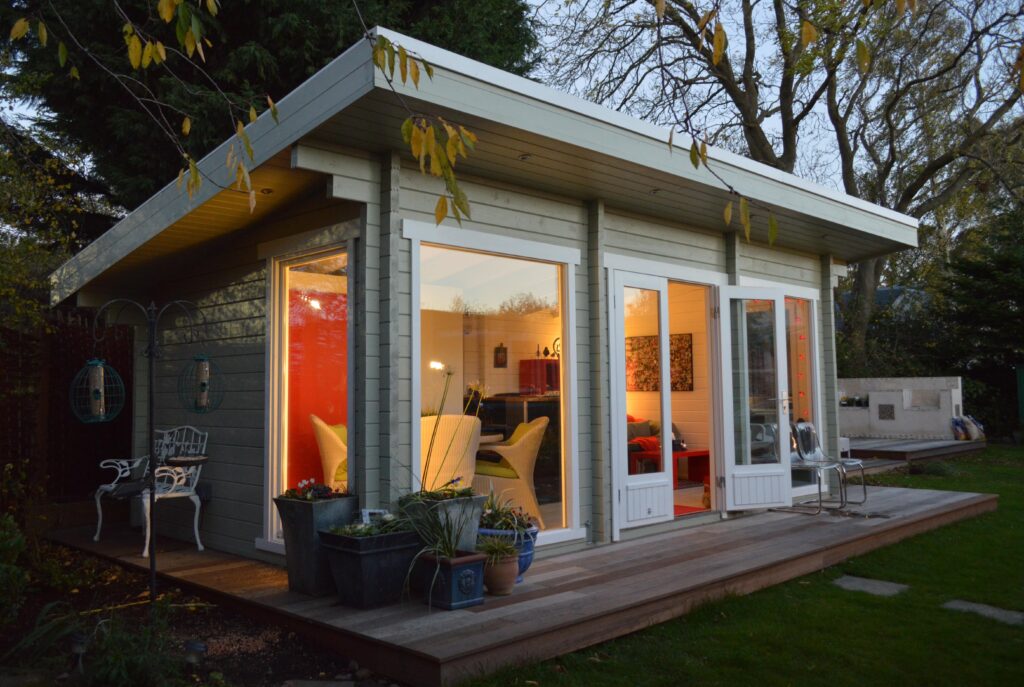Like many other Estonian timber companies, Palmako can trace its origins to the dawn of capitalism in the 1990s, when a group of forestry specialists saw the opportunity to go into business for themselves. Building a solid foundation with storing and exporting timber, the company’s founders soon had an epiphany on a trip to Finland, where they saw rows of wooden log houses and summer cottages. They were convinced that this would be the next big thing in Estonia as well.
The reasoning was logical enough – Estonians were accumulating more and more wealth and after securing a first home and a semi-decent private car, people would start paying more attention to their leisure time and looking for second homes in the countryside. This process however took longer than expected and in the early 2000s Palmako changed its course to building compact garden houses from wooden materials. Much to the chagrin of skeptics who had little faith in the venture, Palmako has grown into a market leader in its own niche across Europe.
Timber is in the DNA
Wood runs as the common denominator throughout Palmako’s product portfolio. “We can certainly state that timber is in our DNA, it’s in everything that we do,” CEO Rain Raudsepp says. Timber is a high-quality renewable building material and can be utilised without a single splinter going to waste. “Our output ranges from garden houses to laminated timber components to rounded timber all the way to pellet fuel, we upgrade timber to the maximum.”
Environmental consciousness is one of the main values the company follows in their daily operations. Most of the power consumed at the factory in Kavastu is solar-generated and thousands of sensors and computers ensure that all material is used as efficiently as possible.
Made in Estonia stands for premium quality
Palmako’s main products are small wooden houses, playgrounds, garden furniture and fences – all sold under their own brand at DIY and gardening shops everywhere in Europe. The level of quality and confidence has allowed Palmako to move higher in the value chain, they no longer need to focus on rebranding to others or white label sales. “Our customers on our main export markets already associate “Made in Estonia” with premium quality, but our key strength lies in flexibility and a diversified portfolio,” explains Raudsepp. The company’s clients include B2B wholesale centres and B2C retail chains – the former are happy with Palmako’s wide variety of products shipped from a single source and the latter appreciate the level of quality at affordable rates. It has taken years to build a network of trusted partners, but today Palmako’s products are available at thousands of points of sale. The early days weren’t always the easiest.
“At some stage our owners had to drive to far-away destinations on sales calls, sleeping in tents. We are eternally grateful to the early clients who trusted a group of Estonians still smelling of campfire smoke in those board room meetings. But we’ve proven our reliability and have built a solid reputation on that. Now we’re reaping the rewards,” Raudsepp is proud. Palmako’s founders have expanded their business into a pan-European network of 34 subsidiaries as the largest Estonian-owned forestry and timber industry concern Lemeks Group, employing over 1000 people in Estonia, Latvia, Sweden, Norway, France, Germany and the United Kingdom.
Competing internationally from day one
Raudsepp believes that Estonian timber producers got a jumpstart in the early 90s because they immediately set their sights on export markets due to the small size of the domestic market. “This forced us all to be more efficient and provide better quality than anybody else, strengthening the entire sector.” There haven’t been any attempts to protect the market or build a system of subsidies – survival in the fierce free market economy has made Estonian business more resilient to change and upset. Today the timber industry in Estonia relies on modern and flexible technology as its competitive edge, providing world-class products through investing in state-of-the-art equipment. Hardworking Estonians can deliver superhuman results in their niches, as larger operators are unable to provide smaller production series or more complex solutions. The ability to adapt to quickly changing circumstances and to interact with different cultures set the foundation for Estonians’ success on global export markets in other fields as well.
Palmako’s largest market share is in wooden playhouses for children. “This has proven to be a very successful niche, as wood is a child-friendly building material and customers tend to be more willing to spend on their children than on themselves. We can consider ourselves to be the largest producer of wooden attractions for children on the entire European continent, but our market share in garden houses is also something to be proud of – every year we sell more than 60 thousand different garden houses,” says Raudsepp.
No alternative to timber
The business model of Palmako is founded on the belief that there’s no alternative to timber as a building material in the long run. “We won’t be able to save our planet by switching off the lights once per year, but choosing
appropriate renewable building materials can contribute a great deal to the Earth’s future sustainability.”
Forests cover nearly a half of Estonia’s territory. Not only is wood a source of income, forests also serve as a spiritual haven. “We need to manage our forests to ensure a balance between the economy and the ecology,” explains Raudsepp.
As a locally-harvested material, timber is more resilient to disruptions in the global supply chains. The local importance of timber upgrading is beyond comparison, as most of the sawmills and production facilities are in the countryside, providing work to at least 60 thousand people in Estonia and balancing the inequality between rural and urban areas.
